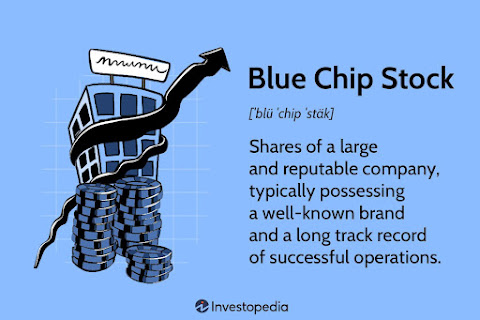Decades ago, maybe when I was in college, I heard relatives at a family event talk about blue chip shares. It was the first time I heard the term, and I can't recall the event, but the term stuck with me. In recent years, I've become quite familiar with investments and now understand well what a Blue-Chip stock is.
A month ago, a client in his early 60s, a senior citizen, asked us to help him invest in mutual funds. He wasn't familiar with mutual fund schemes but insisted on investing in those involving Blue Chip Shares. When we suggested a few schemes, he wanted to know the specific shares they invested in. We checked the fact sheet and provided him with the details. He was happy with the information and gave us a cheque for the investment.
My interaction with this client inspired me to write this article.
What are blue chip shares?
Blue chip shares are like “rock stars” in the stock market. They belong to large, well-established companies with a strong reputation. These companies are giants that have proven themselves over time.
Investors often see blue chip shares as safe bets. They are sturdy and reliable. People trust these companies because they have a history of stability and success.
A key characteristic of blue chip companies is their consistent performance. These companies have a track record of making profits year after year. It's like a reliable friend who you can count on.
When you own blue chip shares, you are actually owning a piece of a big, successful business. You become a shareholder, which means you have a small ownership stake.
Investors are drawn to blue chip shares because they offer a sense of security. It's like having a strong fortress in the unpredictable world of finance. Even when the market is turbulent, blue chip shares hold their ground.
The term "blue chip" originated from the world of poker, where blue chips traditionally held the highest value. In the early 20th century, this concept was adopted in the stock market to refer to stocks of large, well-established companies with a reputation for stability and reliability. These companies were considered as safe and valuable as the blue chips in poker, hence the term "blue chip stocks." Over time, the term has become synonymous with top-tier, financially sound companies in the financial and investment context.
Some well known Indian blue chip companies are Reliance Industries, Hindustan Unilever, HDFC, Infosys, SBI, ITC. Globally we can include Coca-Cola, Apple, Google and Microsoft. These giants are considered blue chip because they are leaders in their industries.
The stability of blue chip companies doesn't mean they won't face challenges. However, these companies inspite of the challenges weather storms and continue to grow. Investors appreciate this ability to withstand tough times.
Blue chip shares provide a solid foundation, balancing risk with reliability. It's like building a sturdy house where blue chip shares form the unshakable base.
Dividends are another attractive feature. It's like receiving a portion of the company's profits as a thank-you for being a shareholder. This regular income stream adds sweetness to the investment.
Investors often view blue chip shares as long-term companions. It's like planting seeds that grow into mighty trees over time. The patient investor reaps the rewards of loyalty to these stalwart stocks.
However, blue chip shares are not immune to market fluctuations. Even the strongest can face challenges. It's like a champion boxer occasionally taking a hit. Yet, they usually recover and continue their winning streak.
The value of blue chip shares is closely tied to the overall health of the economy. It's like a barometer, indicating the economic climate. When the economy thrives, blue chip shares often flourish too.
The process of choosing blue chip shares involves careful analysis. It's like picking the best fruits at a market. Investors look at financial reports, company history, and industry trends to make informed decisions.
Blue chip shares are not only for seasoned investors; beginners can benefit too. It's like learning to ride a bike with training wheels. Blue chips provide stability as new investors navigate the exciting but sometimes bumpy stock market journey.
The allure of blue chip shares extends globally. It's like a universal language spoken by investors worldwide. These stocks are recognized and respected on the international stage.
Blue chip companies are the pillars of the stock market. They represent strength, reliability, and long-term potential. Like a dependable friend, they stand by investors, offering stability in a dynamic financial landscape.
The content made available in this article is for general informational purposes only. While every effort has been made to ensure the accuracy and completeness of the content, it should not be considered as a substitute for professional consultation.









